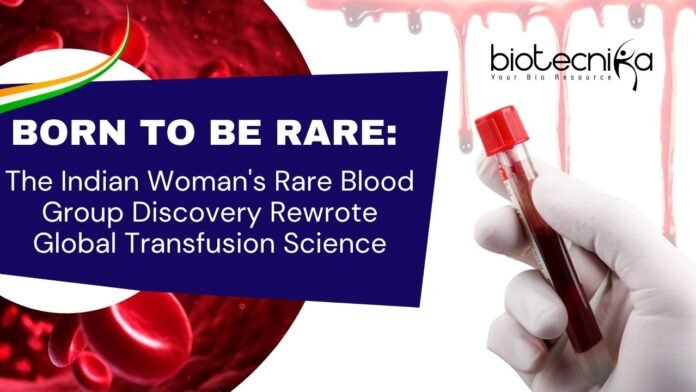Born to Be Rare: The Indian Woman’s Rare Blood Group Discovery Rewrote Global Transfusion Science
What began as a routine heart surgery in a small-town hospital soon became a medical milestone, as an Indian woman’s rare blood revealed a previously unknown antigen that stunned the global medical community.
When a 38-year-old woman from Kolar, Karnataka, was admitted for Cardiac Surgery, no one thought that her blood would defy Science and write History. Initially, her blood group was identified as O Rh positive, which is the most common blood group globally. But then, later, her blood turned out to be incompatible with every available O-positive unit in the hospital. The blood mystery deepened, and what followed was a remarkable journey of Scientific investigation and global collaboration.
After months of rigorous Molecular Testing, a never-before-seen blood group antigen was discovered. It’s officially named as CRIB, and is a Historic addition to the Cromer Blood Group System. Led by Dr. Ankit Mathur and his team at the Rotary Bangalore TTK Blood Centre, this incredible case has stunned the Medical community and redefined the frontiers of transfusion Science.
This Indian woman’s rare blood group case challenged conventional transfusion Medical protocols and set off a global Scientific investigation.
A Rare and Puzzling Discovery
The extensive Blood tests revealed that her blood was panreactive in nature, meaning it was incompatible with all standard donor samples tested against it. Dr. Ankit Mathur stated, “Using advanced serological techniques, our team found that her blood was panreactive, incompatible with all test samples.” This indicated the possibility of a rare or unknown blood antigen.
To identify a potential match, blood samples from 20 of her family members were tested. And to everyone’s surprise, none of the blood samples were compatible either. Despite the lack of transfusion support, the patient’s surgery was successfully carried out. It was performed without requiring any donor blood, all thanks to careful planning by her Medical team and the support of her family.
International Investigation and the Naming of CRIB
Blood samples from the patient and her relatives were then sent to the IBGRL (International Blood Group Reference Laboratory) in Bristol, the UK, a global leader in blood group research. Over the course of ten months, the IBGRL team collaborated with Indian researchers to conduct extensive Molecular Testing and Genetic Analysis.
The result: The discovery of a previously unidentified antigen is now formally recognized and named CRIB. This new antigen is part of the Cromer (CR) blood group system. The name ‘CRIB’ reflects its scientific and geographical roots:
- CR stands for Cromer,
- I stands for India,
- B stands for Bangalore
“Ten months of extensive research and molecular testing resulted in the discovery of a previously unknown blood group antigen now officially named as CRIB,” confirmed Dr. Mathur.
Global Recognition and Impact
This case was officially presented at the 35th Regional Congress of the ISBT (International Society of Blood Transfusion) held in Milan, Italy, in June 2025, where it received international recognition as a landmark discovery in transfusion science.
This marks a significant advancement, particularly for India, as this Indian woman’s rare blood has now contributed to expanding the global registry of rare phenotypes, crucial for ensuring safe transfusions.
Rare Donor Registry: A Step Toward Future Readiness
In response to such rare and complex cases, the Rotary Bangalore TTK Blood Centre has initiated a Rare Donor Registry in collaboration with the Karnataka State Blood Transfusion Council, the Indian Institute of Hematology (IIH) under ICMR, and the International Society of Blood Transfusion.
“We have been instrumental in identifying and providing optimal transfusion support to several other rare blood type patients in recent years. These cases have also been published and presented to international forums (e.g., D–, Rh null, In b negative, etc.),” said Dr. Mathur.
The CRIB antigen is now globally recognized and marks another milestone in India’s growing track record of identifying rare blood groups.
“This discovery reinforces India’s contribution to rare blood group research. We have previously supported multiple rare blood type cases, including Rh null and In b negative, all documented and presented internationally,” added Dr. Mathur.
The registry aims to identify voluntary donors with rare or unknown blood types, allowing clinicians to provide safe, timely, and precise transfusion support for patients across India.
The Science Behind the Discovery
While the ABO and Rh blood group systems are commonly known, there are over 360 recognized antigens across 43 blood group systems worldwide. Rare blood groups can pose life-threatening complications during surgeries or transfusions when mismatches occur.
The discovery of the CRIB antigen adds to this growing body of knowledge. It emphasizes the need for advanced Diagnostics, Genetic Screening, and rare blood donor databases, particularly in a genetically diverse country like India.
From a modest hospital room in Kolar to the global stage of scientific recognition, this Indian woman’s rare blood discovery reminds us that Medical innovations often come from the most unexpected places. The identification of the CRIB antigen is not just a triumph of Science; it’s a story of resilience, collaboration, and the endless possibilities hidden within the human body. As researchers around the world now explore the implications of this finding, one truth stands clear: sometimes, History is not made in grand laboratories, but in the most unexpected corners of the world, by people who never knew they were extraordinary.























